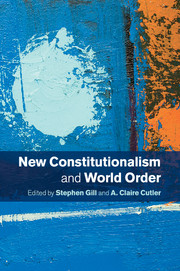Book contents
- Frontmatter
- Contents
- List of Figures
- List of Contributors
- Acknowledgements
- List of Acronyms
- 1 New constitutionalism and world order
- Part I Concepts
- Part II Genealogy, origins and world order
- Part III Multilevel governance and neo-liberalization
- Part IV Trade, investment and taxation
- Part V Social reproduction, welfare and ecology
- Part VI Globalization from below and prospects for a just new constitutionalism
- Glossary
- Appendix
- Bibliography
- Index
1 - New constitutionalism and world order
General introduction
Published online by Cambridge University Press: 05 February 2014
- Frontmatter
- Contents
- List of Figures
- List of Contributors
- Acknowledgements
- List of Acronyms
- 1 New constitutionalism and world order
- Part I Concepts
- Part II Genealogy, origins and world order
- Part III Multilevel governance and neo-liberalization
- Part IV Trade, investment and taxation
- Part V Social reproduction, welfare and ecology
- Part VI Globalization from below and prospects for a just new constitutionalism
- Glossary
- Appendix
- Bibliography
- Index
Summary
This introduction sketches some of the book’s central considerations and relates them to the immediate historical backdrop of this study. It highlights transformations that constitute the new constitutionalism of disciplinary neo-liberalism. We also respond to key criticisms of the concept of new constitutionalism and address whether its theory and practices are under challenge in crisis conditions. We then provide an outline of the principal themes and questions that the volume addresses, including: hegemonic and supremacist projects of rule; the power of capital; law, legitimacy and legitimation; contradictions, political agency and contestation. A detailed overview of each chapter is subsequently provided in separate mini-introductions to each of the six parts of this book.
Aims and considerations
A central contention of this volume is that the new constitutionalism of disciplinary neo-liberalism can be conceptualized as a set of dominant political practices that, despite growing contradictions, are reconstituting political and civil society as well as the relations between humanity and the environment in fundamental ways. We believe that these developments mandate new forms of theoretical integration, for example between law and political economy, to better explain key aspects of the twenty-first-century world and some of its potentials for transformation. In that context our principal aim is to map out and explore a new terrain of enquiry in a synthesis of diverse forms of knowledge (law, politics, political economy, sociology and ecology) to seek to explain the reconstitution of power and governance in the emerging world order – one that is characterized by increasing crises, dislocations and political contestation in ways that are reframing the very meaning of traditional constitutionalism.
- Type
- Chapter
- Information
- New Constitutionalism and World Order , pp. 1 - 22Publisher: Cambridge University PressPrint publication year: 2014
- 7
- Cited by



